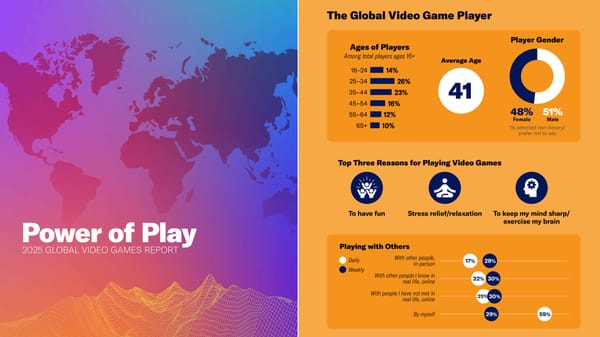Industry Associations Led by ESA Present Global Gamer Study Power of Play




The Power of Play study is likely one of the most comprehensive surveys of gamers' thoughts and opinions. In Europe, Poland and Sweden participated alongside the five key markets of the UK, Germany, France, Spain, and Italy.
The average gamer worldwide is 41 years old. 48% of all gamers are women, and only 1% identify as non-binary or did not specify their gender. These are some of the key findings of the new Power of Play Report, which has now been presented by industry associations worldwide.
The report was produced under the auspices of the US Entertainment Software Association (ESA), but in close cooperation with national organizations in many of the 21 countries represented.
A total of seven countries from Europe participated: the UK, Germany, France, Italy, Spain, Poland, and Sweden. Accordingly, the associations UKIE, game, SELL, IIDEA, AEVI, VideoGamesPoland, and Dataspelsbranschen were also involved. The same applies to the European umbrella organization VideoGamesEurope.
In addition to demographic data on gamers, which naturally must take into account that an important and large group is missing in the under-16 age group, the study also provides interesting insights into the preferences of gamers worldwide. Mobile devices are the most popular platform, accounting for 55% of the market. Computers and consoles/handhelds are surprisingly neck and neck, each accounting for 21%. A further breakdown of the data reveals a similar picture to that shown in national surveys: mobile platforms are particularly popular among female gamers, while PCs are less so.
The country-specific differences revealed by the Power of Play study are interesting. Globally, 68 percent of respondents said that playing online with others is a positive or extremely positive experience. This assessment is particularly pronounced in Brazil (82%), China, Saudi Arabia, and Egypt (75% each). The situation is quite different in Japan and Germany. Both countries are at the lower end of the scale with 56% and 52% respectively.
The question of whether playing games has had a positive influence on career or school progress also leads to very different results. While 50% of all gamers globally say that they have learned technical or behavioral skills through gaming that have had a positive influence on school or work, the figure is only 33% in Germany and 31% in Japan.
Conversely, the survey did not ask whether gaming had negative consequences. However, a recent survey of HR managers in Germany found that gaming as a hobby still often triggers skepticism among HR professionals.
The study was conducted by AudienceNet, which surveyed a total of 24,216 people in 21 countries. The survey only included people who play at least once a week and are between 16 and 65+ years old. In order to obtain qualitatively meaningful results, at least 1,000 gamers were surveyed per country.
The entire study can be downloaded from the VGE website, among other places.
Never miss anything from the German, Swiss and Austrian games industry again: subscribe for free to our Daily newsletter and get all news straight to your inbox.








